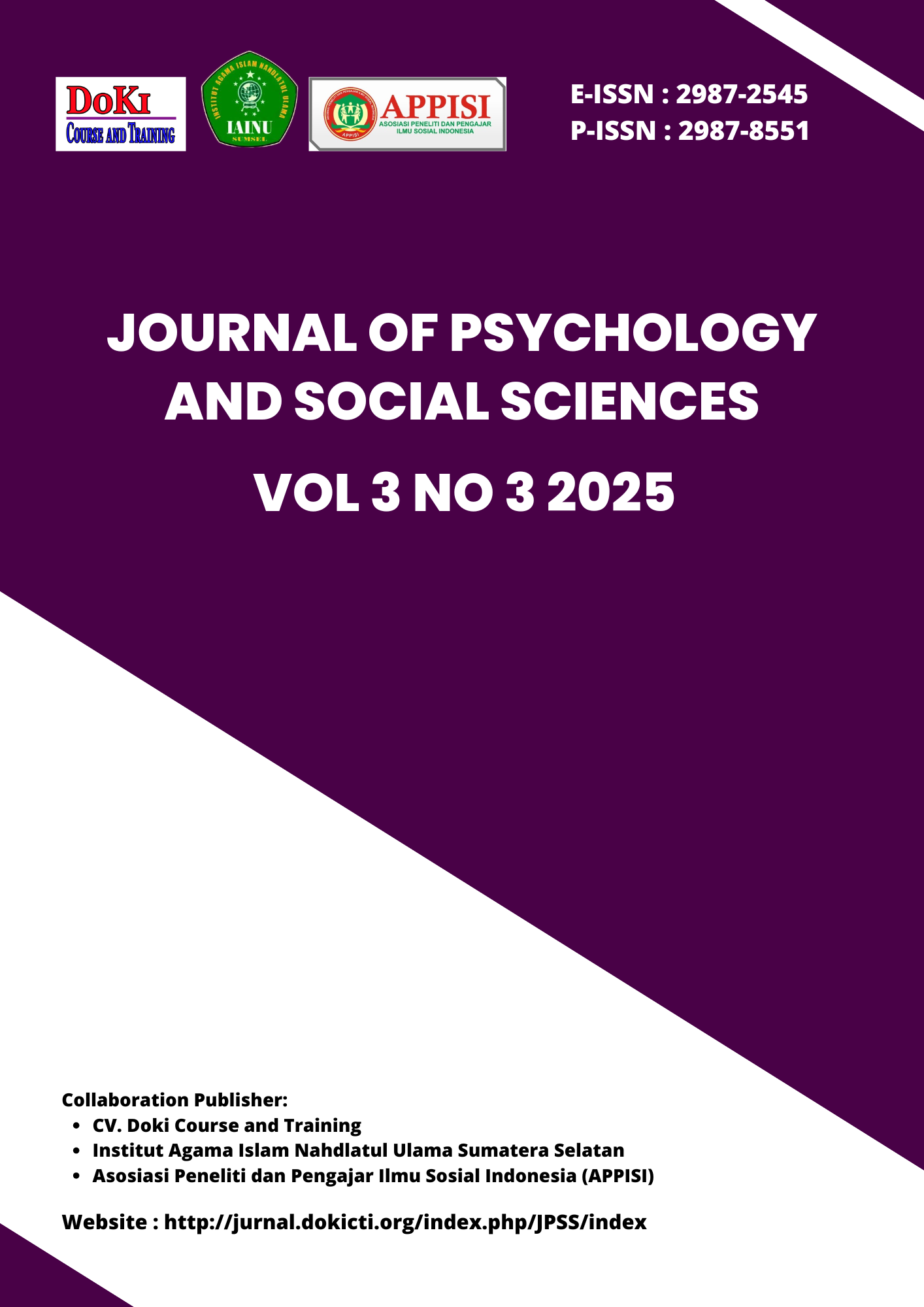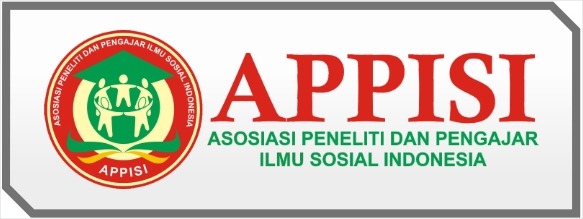The Meaning of Happiness Among Single-Parent Family Students in Secondary School: A Phenomenological Study
DOI:
https://doi.org/10.61994/jpss.v3i3.1209Keywords:
Happiness, Single parent, Social support, Subjective well-beingAbstract
Happiness is a fundamental goal for every individual, including students from single-parent families who face unique psychological and social challenges. However, previous research in Indonesia has predominantly focused on the negative impacts of non-intact family structures, with limited exploration of the subjective meaning of happiness among students from single-parent families. Addressing this gap, the present study explores the meaning of happiness among junior high school students raised in single-parent families in Indonesia through a qualitative phenomenological approach. Data were collected via semi-structured interviews with two purposively selected students from MTs Ma’arif Klaten. Thematic analysis identified that student happiness is shaped by both internal factors—such as coping strategies, personal resilience, and self-acceptance—and external factors, including emotional support from family (despite its non-intact structure), positive social relationships with peers and teachers, and a supportive school environment. These findings highlight that happiness for single-parent students is a dynamic process arising from the interplay between individual psychological resources and social support, rather than being determined solely by family intactness. The study recommends that schools, teachers, and counselors strengthen social support systems and develop inclusive, responsive psychosocial interventions to enhance the psychological well-being and optimal development of students from diverse family backgrounds.
References
Bachman, H. J., Coley, R. L., & Lindsay Chase-Lansdale, P. (2009). Is maternal marriage beneficial for low-income adolescents? Applied Developmental Science, 13(4), 153–171. https://doi.org/10.1080/10888690903287633
Bhandari, N., & Gupta, S. (2024). Trends in Mental Wellbeing of US Children, 2019–2022: Erosion of Mental Health Continued in 2022. International Journal of Environmental Research and Public Health, 21(2). https://doi.org/10.3390/ijerph21020132
Brand, J. E., & Thomas, J. S. (2014). Job displacement among single mothers: Effects on children’s outcomes in young adulthood. American Journal of Sociology, 119(4), 955–1001. https://doi.org/10.1086/675409
Chang, T.-F., Kniess, D., Buschlen, E., & Fernandez, G. (2024). Psychosocial Adjustment of Adolescent Boys from Inner-City, Low-Income, Single-Mother Families: Evaluation of a Youth Program. Child and Adolescent Social Work Journal, 41(6), 951–962. https://doi.org/10.1007/s10560-023-00928-x
Chavda, K., & Nisarga, V. (2023). Single Parenting: Impact on Child’s Development. Journal of Indian Association for Child and Adolescent Mental Health, 19(1), 14–20. https://doi.org/10.1177/09731342231179017
Creswell, J. W., & Poth, C. N. (2018). Qualitative inquiry and research design: Choosing among five approaches (4th ed.). SAGE Publications.
Damota, M. D. (2019). The Effect of Divorce on Families’ Life. Journal of Culture, Society and Development. https://doi.org/10.7176/JCSD/46-02
Dariyo, A. (2004). Memahami Psikologi Perceraian dalam Kehidupan Keluarga. Jurnal Psikologi, 2(2), 94–100. http://download.portalgaruda.org/article.php?article=62924&val=4564
Embley, J. (2014, April 24). Children ‘no less happy in single-parent homes,’ study finds. The Independent. https://www.independent.co.uk/life-style/health-and-families/health-news/children-no-less-happy-in-singleparent-homes-study-finds-9278689.html
Jeynes, W. H. (2006). The impact of parental remarriage on children: A meta-analysis. Marriage and Family Review, 40(4), 75–102. https://doi.org/10.1300/J002v40n04_05
Kamus Besar Bahasa Indonesia. (2016). Keluarga. https://kbbi.kemdikbud.go.id/entri/keluarga
Kleinschlömer, P., & Krapf, S. (2023). Parental separation and children’s well-being: Does the quality of parent-child relationships moderate the effect? Journal of Social and Personal Relationships, 40(12), 4197–4218. https://doi.org/10.1177/02654075231201564
Låftman, S. B. (2010). Family Structure and Children’s Living Conditions. A Comparative Study of 24 Countries. Child Indicators Research, 3(1), 127–147. https://doi.org/10.1007/s12187-009-9059-1
Lee, C. S. (2021). The influence of mindfulness and gratitude on the happiness of high school students: Grit’s moderated mediation model. Perspektivy Nauki i Obrazovania, 52(4), 358–369. https://doi.org/10.32744/pse.2021.4.23
Masten, A. S. (2014). Ordinary magic: Resilience in development. Guilford Press.
Myers, D. G., & Diener, E. (1995). Who Is Happy? Psychological Science, 6(1), 10–19. https://doi.org/10.1111/j.1467-9280.1995.tb00298.x
Merriam-Webster. (2025). Family. In Merriam-Webster.com dictionary. Retrieved April 4, 2023, from https://www.merriam-webster.com/dictionary/family
Nahkur, O., & Kutsar, D. (2022). Family Type Differences in Children’s Satisfaction with People They Live with and Perceptions about Their (Step)parents’ Parenting Practices. Social Sciences, 11(5), 223. https://doi.org/10.3390/socsci11050223
Pandya, S. P. (2023). Adolescents raised by single parents: Examining the impact of spiritual education lessons on school connectedness, wellbeing, and resilience. Children and Youth Services Review, 148, 106885. https://doi.org/10.1016/j.childyouth.2023.106885
Pannilage, U. (2017). Impact of Family on Children’s Wellbeing. Journal of Sociology and Social Work. https://doi.org/10.15640/jssw.v5n1a15
Smith, J. A., Flowers, P., & Larkin, M. (2009). Interpretative phenomenological analysis: Theory, method and research. SAGE Publications.
Sugiyo Pranoto, Y. K., & Hong, J. (2020). Happiness from the perspective of mother and children: Indonesian setting. Early Child Development and Care, 190(2), 185–194. https://doi.org/10.1080/03004430.2018.1461094
Strauss, A., & Corbin, J. (1998). Basics of qualitative research: Techniques and procedures for developing grounded theory (2nd ed.). SAGE Publications
Sun, Y., & Li, Y. (2002). Children’s well-being during parents’ marital disruption process: A pooled time-series analysis. Journal of Marriage and Family, 64(2), 472–488. https://doi.org/10.1111/j.1741-3737.2002.00472.x
Vallejo-Correa, V., Oyanedel, J. C., & Cortés, F. P. (2025). Subjective Well-being, Parental Figures, and Quality of Family Relations: A Study of the International Questionnaire on Child Welfare among Chilean 12-year-olds. Child Indicators Research, 18(3), 937–953. https://doi.org/10.1007/s12187-025-10222-0
Yusuf, H., Fahrudin, A., Ilman Fahrudin, F., Aranda Fahrudin, F., Fahrudin, F., & Aranda, F. (2020). Impact of Single Mother Family on Child Development: A Review Literature.-Palarch’s. Journal of Archaeology of Egypt/Egyptology, 17(10), 1985–1994.
Wiles, R. (2013). What are qualitative research ethics? Bloomsbury Academic.
Downloads
Published
Issue
Section
License
Copyright (c) 2025 Ahmad Fadil, Firyal Magi Ashil Jannah, Ina Kurniati

This work is licensed under a Creative Commons Attribution-ShareAlike 4.0 International License.















